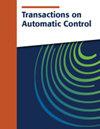为初始状态随机变化的系统优化选择基于循环的 ILC
IF 6.2
1区 计算机科学
Q1 AUTOMATION & CONTROL SYSTEMS
引用次数: 0
摘要
本文章由计算机程序翻译,如有差异,请以英文原文为准。
Optimally Selected Cycle-Based ILC for System With Randomly Varying Initial State
Iterative learning control (ILC) is a widely used method for controlling repetitive processes. However, its superior learning capability from cycle to cycle is mostly predicated on the assumption that the initial state for all cycles is identical and at the desired point. In engineering practice, this assumption can be overly strict. A more common scenario involves the initial state varying randomly from cycle to cycle. In this article, we propose an optimally selected cycle-based ILC scheme to address the issue of randomly varying initial states. Our approach involves selecting an optimal cycle for iterative learning by evaluating both the potential impact of initial state variations and the tracking performance of historical cycles. By extending the learning mechanism of ILC from learning from the previous cycle to learning from the past optimally selected cycle, our scheme ensures improvement after each iteration of learning. In addition, our scheme has been adapted to accommodate uncertain systems with greater generality. The feasibility and convergence properties of our scheme are investigated through theoretical analysis. Finally, we demonstrate the effectiveness and other properties of the proposed method through a benchmark numerical example.
求助全文
通过发布文献求助,成功后即可免费获取论文全文。
去求助
来源期刊

IEEE Transactions on Automatic Control
工程技术-工程:电子与电气
CiteScore
11.30
自引率
5.90%
发文量
824
审稿时长
9 months
期刊介绍:
In the IEEE Transactions on Automatic Control, the IEEE Control Systems Society publishes high-quality papers on the theory, design, and applications of control engineering. Two types of contributions are regularly considered:
1) Papers: Presentation of significant research, development, or application of control concepts.
2) Technical Notes and Correspondence: Brief technical notes, comments on published areas or established control topics, corrections to papers and notes published in the Transactions.
In addition, special papers (tutorials, surveys, and perspectives on the theory and applications of control systems topics) are solicited.
 求助内容:
求助内容: 应助结果提醒方式:
应助结果提醒方式:


